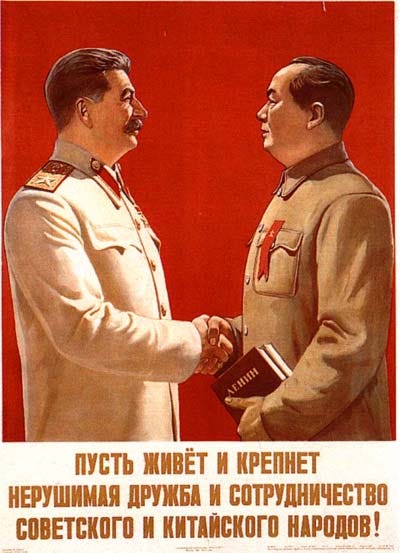Can We Talk About an Axis Between the People’s Republic of China and the Russian Federation?
Impossible Alliance, Unlikely Breakup, Limited Distance
Mao and Stalin “May the indestructible friendship and collaboration of the Soviet and Chinese peoples survive and strengthen!” Picture: Andy Doro
Trying to capture the relationship between Beijing and Moscow with a single adjective is not only an impossible task, but also an endeavor that would make little sense. Moreover, anyone looking at history will easily see that previous relations between the two states have gone through multiple phases, alternating between honeymoons, strong hostility and, ultimately, more often than not, pragmatic relations without excessive warmth.
In any case, talking about a formal alliance would be inappropriate, to say the least. This was also the view of a former Chinese foreign minister, Qin Gang, and of most of the analysts, even though Xi Jinping defined the “unlimited friendship” between the two countries as superior to an alliance. Equally inappropriate is the idea, sometimes expressed by certain Western leaders, that it would be possible to drive a lasting wedge between the two countries. It was also quite symptomatic of the simplistic thinking that prevailed among some when, after February 24, 2022, they switched from the rhetoric of “relying on Moscow to contain Beijing” to the opposite blunder that we should “move closer to China to force Moscow to make peace.” There was even a time, in 2023, when some people imagined, contrary to all evidence and reason, that Beijing could play the role of mediator in the Russian war against Ukraine—as if, moreover, a “mediator” were needed, which was another form of misunderstanding the reality of this war.
I would suggest using the term “axis” to characterize this relationship. There is indeed a Russian-Chinese axis, or more precisely between the Chinese and Russian regimes. This axis is based on interests that are essentially ideological and, occasionally but only occasionally, economic. Relations between Beijing and Moscow have certainly changed in nature since Xi Jinping came to power in 2012. Russia appears to China not only as a tool for pursuing its own ends, but also and above all as a country whose policies, at least for a certain period of time, are ultimately quite convergent with those of the Asian giant. In a way, North Korea and Iran are junior partners in this axis. The term “Axis” has a historical connotation here that is not without resonance today.
Therefore, this relationship cannot be considered an alliance—the concept of alliance is, by definition, antithetical to the totalitarian nature of a regime. An alliance requires a long-term relationship based on vital mutual interests that transcend certain immediate interests that may give rise to occasional disagreements that both parties will seek to resolve, as is often the case between the countries of the Atlantic Alliance—although this is certainly an open question with Trump’s United States. China and Russia cannot be allies in this sense, as their relationship is too unequal for that. “Unlimited friendship,” as it is officially described, is neither friendly nor unconditional.


